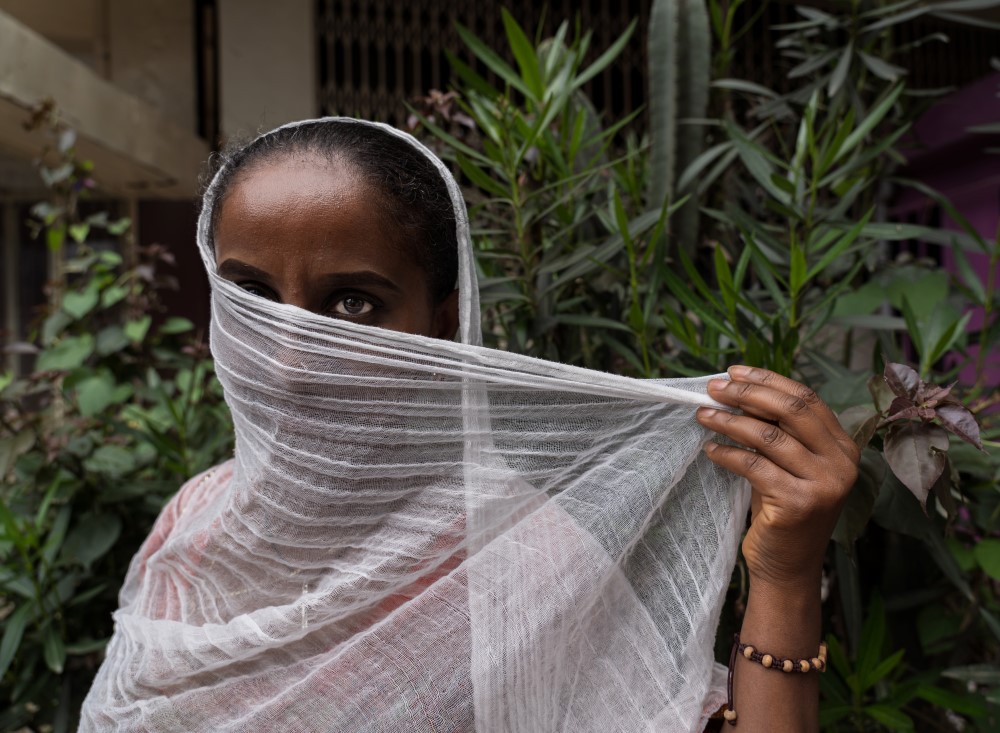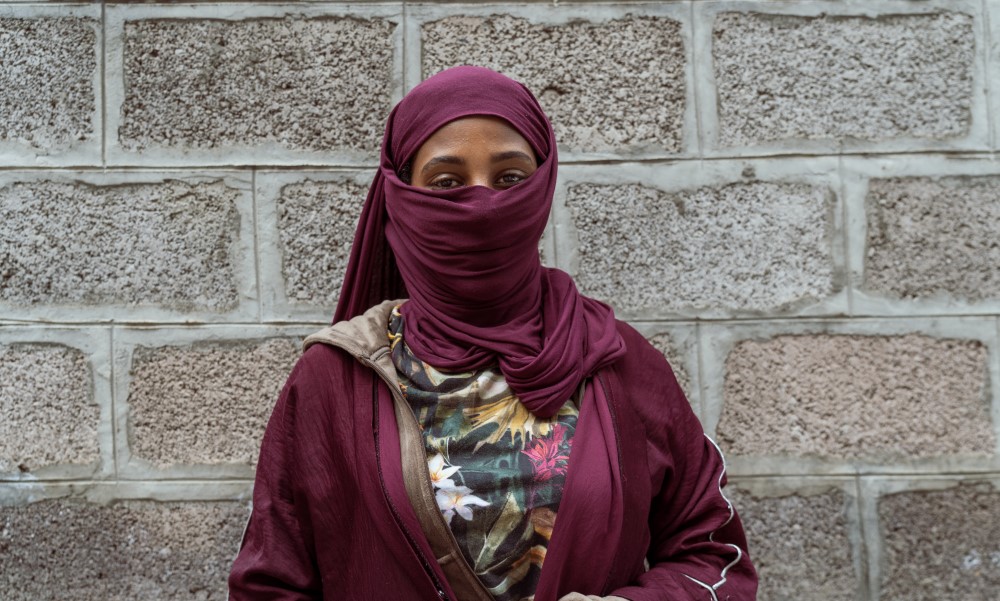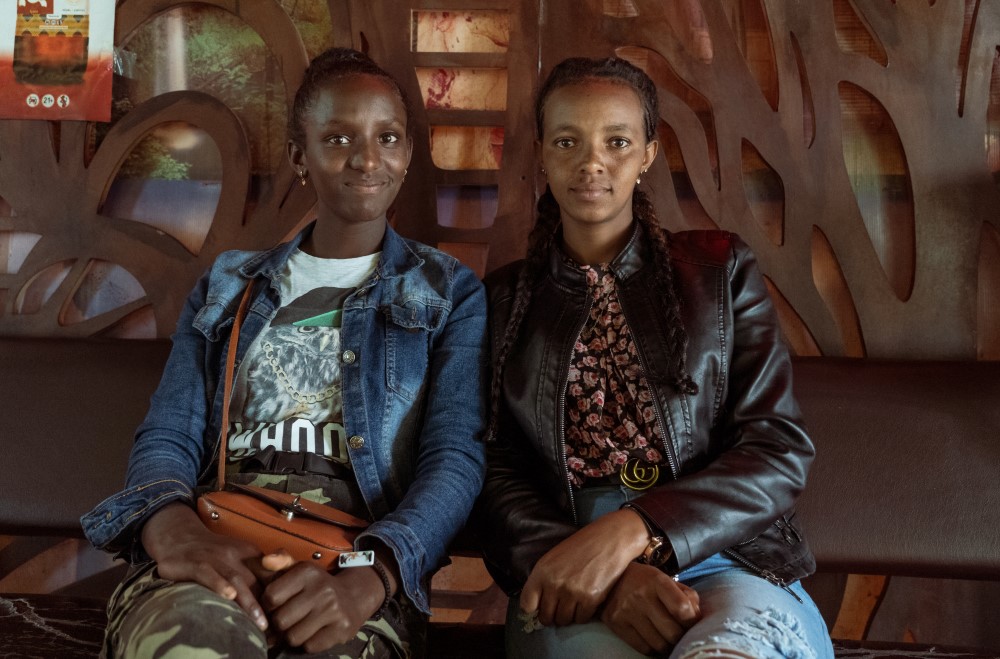Observers fear that an official programme sending domestic workers to Saudi Arabia is not so different to the operations of human smugglers.

Betty* was abused by her employers in Lebanon before fleeing. She was eventually arrested and detained in a deportation camp for months along with other domestic workers before being deported back to Ethiopia. Credit: Jaclynn Ashly.
Young women stand in a long queue outside the Department for Immigration and National Affairs office in Addis Ababa, Ethiopia, the line wrapping around and continuing down an adjacent street. Bundled in their hands are various papers and files.
Most are here to apply for a passport so they can travel abroad to Gulf countries for domestic work, escaping an economic crisis and soaring unemployment in Ethiopia. “I want to find a job that pays me well,” says 20-year-old Garnaii Ta, who is planning to travel to Saudi Arabia, a main destination for Ethiopian workers. She is from a village outside the capital and has not continued her education past secondary school. Many other women in her village have also travelled to the Gulf to find work.
“Even if you find a job in Ethiopia, it never pays well,” she says. “I want to get a good job in Saudi Arabia and save some money. Then, when I come back to Ethiopia, I can start a business. I want to be economically independent one day.”
An estimated 200,000 women leave Ethiopia annually to find opportunities as domestic workers in the Gulf States and the Levant, according to the International Labour Organisation (ILO). These journeys have typically been arranged by recruitment agencies or human smugglers, but Ta’s voyage is being organised by the Ethiopian government.
She is one of some 500,000 women, between the ages of 18 to 40, who the government hopes to recruit for domestic work positions in Saudi Arabia, following an agreement between the two countries. Ethiopian officials purport that this deal, along with similar ones made with Jordan and Lebanon, will safeguard the women’s human and labour rights in the country, where nightmarish stories of abuses have surfaced over the years.
The programme will serve as an official channel of migration, officials say, and discourage Ethiopians from taking perilous journeys through Djibouti and Yemen where many migrants have lost their lives. Hundreds of Ethiopians, and possibly more, who have attempted this route have been shot and killed by Saudi border guards, including many women and children.
The mass recruitment drive, which began in April 2023, also has another objective: to increase remittances at a time when Ethiopia is facing a dire forex shortage. Under the official programme, all salaries are sent to local Ethiopian banks and paid in Ethiopian birr.
The government sees the scheme as a win-win, but human rights observers fear that the government is misleading young women into traveling to countries where risks of human rights violations remain high in order to help stabilise the national economy. Evidence suggests that Ethiopian officials are not operating so differently to human smugglers, downplaying the dangers of abuses and promoting unrealistic expectations to lure women into the programme.
“It was horrible”
Mariam* was just 16 when she travelled to Saudi Arabia and became a domestic worker. Like thousands before her, her passport was immediately confiscated when she arrived at the family’s home. This is typical for migrant workers governed by the country’s kafala system, which has been compared to modern day slavery, whereby a worker’s legal residency status is linked to an employer.
Migrants are unable to quit their jobs without their employer’s consent, leaving them vulnerable to abuse. If they leave, they risk arrest and deportation. This private sponsorship system continues to manage the lives of migrant workers in most Gulf countries. Despite some implementing reforms over the years, they have done little to protect the rights of migrant workers.
Up to 10,000 Asian migrant workers die each year in Gulf countries, with more than half the deaths recorded as “unexplained”. Between 2020 and 2021, at least 89 Kenyans, most of whom were domestic workers, died mysteriously in Saudi Arabia. Deaths of migrant workers are rarely investigated.
What Mariam thought would be an opportunity to save money quickly turned into a nightmare. “The wife forced me to work non-stop,” the now 25-year-old recounts. “I was barely ever able to sleep. She forced me to clean with strong-smelling and dangerous chemicals that would make me sick and nauseous. She refused to give me my salary for three months.” Mariam was only paid 700 Saudi riyals (about $186) per month, below the 1,000 riyals ($266) typically paid to domestic workers.
After a year, she decided to flee the family, leaving her passport behind. For several years she remained in Saudi Arabia undocumented, working in menial domestic jobs, until she was arrested. She was confined in a deportation centre with her one-year-old son.
“It was horrible,” Mariam says. “We were held in a large hall with about 100 other detainees. All of them were Africans. There were no beds and no blankets. We were never offered a change of clothes. The food was disgusting and there was always a terrible smell because of the bad hygiene.”
Mariam says the conditions in the deportation centre were so bad that she witnessed four children die due to malnutrition or disease. “One of the mothers whose child died tried to hang herself in the bathroom,” she remembers.
She didn’t know when she would be released and wasn’t allowed to explain her situation to any officials. “They didn’t see us as human beings so who would listen to us?” Mariam was deported back to Ethiopia after three months, in 2021. Other women, however, were held for about a year, Mariam observed.

Mariam traveled to Saudi Arabia when she was just 16 and mistreated by her employers. She fled and was eventually arrested and kept at a deportation camp in squalid conditions before being deported to Ethiopia. Credit: Jaclynn Ashly.
Disturbing stories like these are well-known in Ethiopia. But they have not deterred women like Ta. “I’m a bit scared,” she says. “But in Ethiopia I have a miserable life, so if I end up having a miserable life there then it wouldn’t make much of a difference. I might as well just take the risk.”
She expresses hope that the government programme will shield her from abuses. Yet, just like the private recruiter who assisted Mariam’s travel to Saudi Arabia, the government recruiter helping Ta has not informed her of the risks. They simply assured her that her rights will be protected and her salary guaranteed, despite evidence that women on the official government programme are still facing human rights violations, including poor working conditions and unwanted sexual advances from employers.
The deal with Saudi Arabia, signed in 2022, mirrors agreements with other Arab countries, which generally stipulate that host countries are committed to protecting the rights of domestic workers. However, a similar agreement signed in April 2023 with Lebanon was revealed to not include a minimum wage and to refer to local Lebanese laws, which do not apply to migrant workers.
“If migrant workers are not encoded into the local laws of a country, then these agreements will not make a difference,” says Banchi Yimer, founder of Egna Legna, a collective of Ethiopian domestic workers that advocates for their rights. Yimer says that giving migrants a legal route will help minimise risks associated with journeys to the Gulf but emphasises that “much of these abuses workers face occur inside the homes of the employers, behind closed doors, where they are treated as slaves”.
“The only way to seriously prevent these abuses is to abolish the kafala system,” says Yimer, who was a domestic worker for years in Lebanon. “Anything else is just lip service.”
African Arguments reached out to Ethiopia’s ministry of labour and skills and the ministry of women, children and youth for comment, but did not receive a response. Muferiat Kamil, head of Ethiopia’s ministry of labour and skills, has said that the trainings the workers undergo before travelling to Saudi Arabia, which includes orientation sessions to prepare the women for life in the country, will “diminish the dangers” faced by Ethiopian women. “We’ve held discussions with Saudi Arabia about previous agreements, and improvements on working conditions and salaries have been made,” he stated.
Despite these assurances, Yimer fears that the Ethiopian government will be unable to assist the huge number of migrants expected under the scheme. “The Ethiopian government will not have the capacity to manage half a million people in Saudi Arabia, which has a huge record of human rights violations and no interest in whether these workers’ rights are respected,” she says.
“Sacrificing youth”
While the Ethiopian government may struggle to support the enormous number of domestic workers under the scheme, economists say that the migrants could prove critical in alleviating Ethiopia’s chronic foreign currency shortages and unemployment.
The country’s economy has struggled badly in recent years. The coronavirus pandemic dealt a heavy blow to the nation’s finances and was followed, in November 2020, by a devastating two-year civil war that resulted in the deaths of as many as 600,000 civilians. Amid one of the world’s deadliest wars in recent times, foreign donors withdrew billions of dollars in financial support to Ethiopia over allegations of widespread human rights abuses. The US also ended Ethiopia’s tariff-free access to its market, threatening thousands of jobs in a burgeoning textile industry.
Combined with this, severe droughts and the worst locust swarm infestation in 25 years, along with rising food costs exacerbated by the war in Ukraine, pushed inflation up to an average of 34% in 2022. While the current official exchange rate is 55 birr to the dollar, the scarcity of hard currency has driven the black-market rate to surpass 110 birr to the dollar. With most people turning to the black-market, the government’s crippling shortage of foreign exchange has deepened.
The peace agreement between the government and the TPLF in November 2022 has allowed external aid to flow into the country once again but “the forex issue is still a big problem for Ethiopia”, says Samson Berhane, an Ethiopian economic analyst. “We still have a huge imbalance of payment deficit. Our export is not even $4 billion, while our import is more than $18 billion. So we have a trade deficit of $14 billion.”
He says the government is now looking at remittances to replenish Ethiopia’s forex reserves. National Bank of Ethiopia data shows that remittances reached $4.5 billion in 2019, accounting for some 5% of the country’s GDP and exceeding revenues earned by the export sector.
“People going on the government sponsored work programme means more forex flow into Ethiopia,” Berhane explains, referring also to government schemes facilitating work in less risky countries like the US. “And we’re not talking about a few people, but hundreds of thousands, just to Saudi Arabia alone. This will be a lot of money for the government. It could significantly narrow the trade and balance of payment deficit the country faces.”
Requiring workers’ salaries to be sent to local Ethiopian banks and being released to the workers in birr can also serve to stem the black-market. Additionally, says Berhane, the programmes can ease unemployment, a major issue in Ethiopia.
Data compiled by The Globe and Mail shows that since late-February 2023, more than 200 Ethiopian state institutions, including government ministries, district administrations, and state media, have used their official Facebook pages to promote the Saudi recruitment drive. The report also found that 50 state-run academic institutions have used the social media site to encourage women to abandon their studies for a career in domestic work in Saudi Arabia. Worryingly, the posts by state institutions make no mention of human rights concerns and spread misleading claims, including by greatly inflating the salaries women receive in Saudi Arabia.
“It’s concerning that the government is employing the same tactics long used by private agents, promising good pay, job security, and downplaying the risks,” says Yimer, adding that the use of social media implies the government is targeting younger generations. “It’s their way of reaching out to young people and taking advantage of their eagerness to find jobs and opportunities.”
“We should not be sacrificing our youth in the process of balancing our economy,” she adds. “Slavery is never a solution.”
“I’ve heard the horror stories”
The use of misleading claims to encourage women to work as migrant domestic workers is concerning. However, there is reason to believe that even with full information about the dangers, many people would still choose to take the risk given the lack of opportunities in Ethiopia.
Ta’s 23-year-old sister Tsehay, for instance, is also planning to go to the Gulf to find work. She decided against going through the government programme because of the weak value of the birr and will instead hire a private recruiter and travel through an unofficial channel to the UAE.

Garnaii Ta, 20, sits next to her sister Tsehay, 23. While Ta plans to participate in the Ethiopian government’s mass recruitment drive to find domestic work in Saudi Arabia, Tsehay plans to go through informal channels to travel to the UAE. Credit: Jaclynn Ashly.
A recent Guardian investigation revealed that women are being encouraged by brokers and Facebook ads to work in the UAE, only to be detained and abused in squalid accommodation upon their arrival. Recruitment agencies, who are awarded licenses to operate by the Emirati government, then sell the workers over apps and social media platforms to household employers. Women’s photos are displayed, alongside their personal information, in dozens of adverts on Facebook, Instagram, and TikTok.
One licensed recruitment agency has an app and website where people can select, order, and pay for a maid without meeting them first. The monthly prices of the maids vary according to race, with Africans going for the lowest rates. The website also states that Filipina maids require a private bedroom, while African maids do not.
“I’ve heard all the horror stories,” says Tsehay. “But I can’t control if it happens to me or not. So I still think it’s worth the risk. I try to focus on the positives. I get a new opportunity and a new experience. And for the first time in my life, I get to experience what it’s like to live in a different country.”
*names changed





